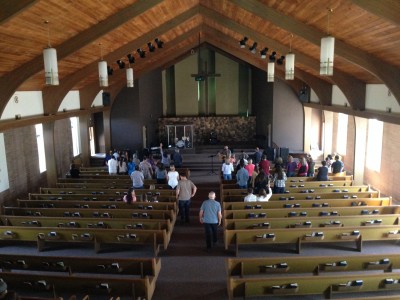
Last Sunday Morning (August 24th) at 3:20 AM I woke up to one of the scariest moments of my life.
As we all now know, the South Napa Quake was a 6.1 on the Richter Scale. My family faired far better than just about everyone else we know. Where we only lost one jar, others weren’t so fortunate. Friends and neighbors were without power, some for days. Shops and businesses were shut down, as were the local schools and several roads. All told it’s currently estimated that the total impact on the region will be somewhere between $500 million and $1 Billion.
But it was Sunday morning and the question became: what are we going to do about church?
Our lead pastor went over to the building to evaluate the situation. There was no obvious structural damage, but there was a huge mess to clean up. The decision was made that we would hold church services, but that they would be very different than the one we had scheduled.
So at 10:15 am we gathered for church like we do every Sunday. It was a much smaller service than normal with less than a third of our church in attendance. Almost none of us had slept since the quake, and all of us had been cleaning up our houses, or the church, or the houses of friends and family.
My goal with the rest of this post is to pass on a few lessons I’ve learned from our post-quake church service that will hopefully help others as they lead worship and serve the church when hard times come.
SHOULD WE HAVE EVEN HAD CHURCH?
Some churches cancelled service by choice. Other churches in town had to cancel due to structural damage. We felt lead to open Cornerstone Ministries’ doors and see who showed up. Some needed to pray and worship. Others needed comfort. For some, it was good just to not be alone. The churches who cancelled did what they felt lead to do, we did what we thought was best for us. Neither is more right or wrong than the other.
THROW OUT THE PLAN
Some of us can get tunnel vision when a plan is put in place. I would fall into this category. You may not find yourself leading worship hours after a major earthquake, but maybe something else has changed the game.
Whatever the thing is, you need to be willing and flexible to make changes. For us it was a shorter service with just me on guitar and a short message from our pastor with a time for prayer and to network a little to see who needed help and what stores and resources were open and what was closed or unavailable.
KEEP IT SIMPLE & KNOW THE MOMENT
When the power is out, this is no time for new songs. We told that band to stay home if they needed to, or come if they wanted to, but it was just going to be me on my guitar.
The songs I played on my guitar were direct results of the moment we were in. Simple songs. Songs everyone knew. Songs that pointed to God, showing his holiness, his goodness, his steadfastness. Songs that spoke of the moment. On Christ the Solid Rock I Stand was what I started with and I ended with How Great Thou Art.
To keep it simple with the songs, there were no “third verses” or new songs. Mostly, it was either simple choruses or just a chorus and bridge or a 1st verse of well-known songs. People needed to sing to the Lord, and with no power to put the words up, we’ve got to dig into the “campfire songs” more than the current trendy worship tune.
I also didn’t talk a lot. Our Lead Pastor was going to share, so I sang.
FREE THE PEOPLE
One of the things I loved about the service that morning was that my pastor spoke to people’s pain and fear. Yes, Jesus is real, and yes all the stuff that was broken was just stuff, but that doesn’t make people’s feelings and experiences any less valid. Just because something wasn’t a big deal for you doesn’t mean it wasn’t a big deal for someone else.
We weren’t there because we were better or more holy. The honest truth is that most of us were there because we hadn’t been the hardest hit, or to help with the clean up.
As people leading the church, whether in song, prayer or preaching, we can have a great ministry of freeing people. It’s ok to feel what you feel, just make sure you look to Jesus. As worship leaders, it’s ok to not always be joyful or “peppy”. It was appropriate to start off in a minor key. It’s good to be honest, and to lead worship in a way that allows people to be honest as well.
IT WAS GOOD TO BE THERE
It was good to be out with other people. It was good to sing and worship together. It was good to hear people pray and give God both their burdens and their thanksgiving. It was good to hear from the word of God and be reminded of what is true and unshakable.
We had a Baptism and BBQ scheduled for after church that day. The baptism had to be postponed due to lack of water. But we had the food and a lot of folks didn’t have power to cook with so we fired up the grill and ate. It was good food, good to hear people’s stories, and since a lot of regular guys weren’t there, it was a good chance to see others step up and serve.
I’m glad these types of Sunday Mornings don’t happen often. But when they do come, hopefully some of our experiences at Cornerstone will help you navigate whatever curveballs life throws your way.



 Art Matters
Art Matters